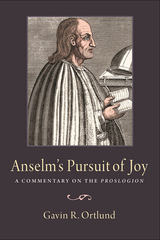
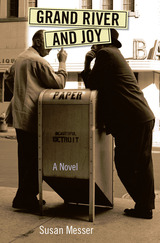
"With unsparing candor, Susan Messer thrusts us into a time when racial tensions sundered friends and neighbors and turned families upside down. The confrontations in Grand River and Joy are complex, challenging, bitterly funny, and---painful though it is to acknowledge it---spot-on accurate."
---Rosellen Brown, author of Before and After and Half a Heart
"Grand River and Joy is a rare novel of insight and inspiration. It's impossible not to like a book this well-written and meaningful---not to mention as historically significant, humorous, and meditative."
---Laura Kasischke, author of The Life Before Her Eyes and Be Mine
Halloween morning 1966, Harry Levine arrives at his wholesale shoe warehouse to find an ethnic slur soaped on the front window. As he scavenges around the sprawling warehouse basement, looking for the supplies he needs to clean the window, he makes more unsettling discoveries: a stash of Black Power literature; marijuana; a new phone line running off his own; and a makeshift living room, arranged by Alvin, the teenaged tenant who lives with his father, Curtis, above the warehouse. Accustomed to sloughing off fears about Detroit's troubled inner-city neighborhood, Harry dismisses the soaped window as a Halloween prank and gradually dismantles “Alvin's lounge” in a silent conversation with the teenaged tenant. Still, these events and discoveries draw him more deeply into the frustrations and fissures permeating his city in the months leading up to the Detroit riots.
Grand River and Joy, named after a landmark intersection in Detroit, follows Harry through the intersections of his life and the history of his city. It's a work of fiction set in a world that is anything but fictional, a novel about the intersections between races, classes and religions exploding in the long, hot summers of Detroit in the 1960s. Grand River and Joy is a powerful and moving exploration of one of the most difficult chapters of Michigan history.
Susan Messer's fiction and nonfiction have appeared in numerous publications, including Glimmer Train Stories, North American Review, and Colorado Review. She received an Illinois Arts Council Fellowship in prose, an Illinois Arts Council literary award for creative nonfiction, and a prize in the Jewish Cultural Writing Competition of the Dora Teitelboim Center for Yiddish Culture.
Cover photograph copyright © Bill Rauhauser and Rauhauser Photographic Trust
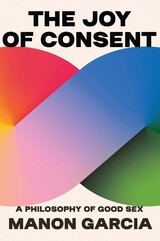
“From the bedroom to the classroom to the courtroom, ‘consent’ is a key term in our contemporary sexual ethics. In this timely reexamination, Manon Garcia deftly reveals the hidden complexities of consent and proposes how to reconceptualize it as a tool of liberation.”
—Amia Srinivasan, author of The Right to Sex
A feminist philosopher argues that consent is not only a highly imperfect legal threshold but also an underappreciated complement of good sex.
In the age of #MeToo, consent has become the ultimate answer to problems of sexual harassment and violence: as long as all parties agree to sex, the act is legitimate. Critics argue that consent, and the awkwardness of confirming it, rob sex of its sexiness. But that objection is answered with the charge that opposing the consent regime means defending a masculine erotics of silence and mystery, a pillar of patriarchy.
In The Joy of Consent, French philosopher Manon Garcia upends the assumptions that underlie this very American debate, reframing consent as an ally of pleasure rather than a legalistic killjoy. In doing so, she rejects conventional wisdom on all sides. As a legal norm, consent can prove rickety: consent alone doesn’t make sex licit—adults engaged in BDSM are morally and legally suspect even when they consent. And nonconsensual sex is not, as many activists insist, always rape. People often agree to sex because it is easier than the alternative, Garcia argues, challenging the simplistic equation between consent and noncoercion.
Drawing on sources rarely considered together—from Kantian ethics to kink practices—Garcia offers an alternative framework grounded in commitments to autonomy and dignity. While consent, she argues, should not be a definitive legal test, it is essential to realizing intimate desire, free from patriarchal domination. Cultivating consent makes sex sexy. By appreciating consent as the way toward an ethical sexual flourishing rather than a legal litmus test, Garcia adds a fresh voice to the struggle for freedom, equality, and security from sexist violence.
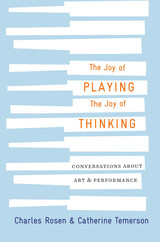
Brilliant, practical, and humorous conversations with one of the twentieth-century’s greatest musicologists on art, culture, and the physical pain of playing a difficult passage until one attains its rewards.
Throughout his life, Charles Rosen combined formidable intelligence with immense skill as a concert pianist. He began studying at Juilliard at age seven and went on to inspire a generation of scholars to combine history, aesthetics, and score analysis in what became known as “new musicology.”
The Joy of Playing, the Joy of Thinking presents a master class for music lovers. In interviews originally conducted and published in French, Rosen’s friend Catherine Temerson asks carefully crafted questions to elicit his insights on the evolution of music—not to mention painting, theater, science, and modernism. Rosen touches on the usefulness of aesthetic reflection, the pleasure of overcoming stage fright, and the drama of conquering a technically difficult passage. He tells vivid stories about composers from Chopin and Wagner to Stravinsky and Elliott Carter. In Temerson’s questions and Rosen’s responses arise conundrums both practical and metaphysical. Is it possible to understand a work without analyzing it? Does music exist if it isn’t played?
Throughout, Rosen returns to the theme of sensuality, arguing that if one does not possess a physical craving to play an instrument, then one should choose another pursuit. Rosen takes readers to the heart of the musical matter. “Music is a way of instructing the soul, making it more sensitive,” he says, “but it is useful only insofar as it is pleasurable. This pleasure is manifest to anyone who experiences music as an inexorable need of body and mind.”

Horrocks begins in the nineteenth century and television’s prehistory as a fantastic, futuristic concept. He follows the television’s journey from its strange roots in spiritualism, imperialism, and Victorian experiments in electro-magnetism to the contested accounts of its actual invention, looking at the work of engineering pioneers such as Philo Farnsworth and John Logie Baird. Unboxing sets all across the world, he details how it arrived as an essential consumer product and began to play an extraordinary role as a bridge between public and private life. Horrocks describes how the console and cabinet themselves expressed status and good taste and how their designs drew on cultural phenomena such as the space race and the avant-garde. He discusses how we have both loved it for what it can provide and reviled it as a sinister object literally controlling our thoughts, and he shows how it has figured in other cultural realms, such as the work of artists like Wolf Vostell and Nam June Paik. Finally, Horrock laments the death of the cathode ray tube and the emergence of the flat-screen, which has reduced the presence of the television as a significant material object. Altogether, The Joy of Sets brings this most elusive object into crystal-clear critical and historical focus.

Through a series of eight exercises, readers learn how to raise their awareness and their spirits to a higher level, to connect more readily with their Higher Power, and to unlock authentic spiritual joy even at life’s most challenging moments. For people working in groups, the authors include suggestions for structuring spiritual growth meetings and tools for discussion facilitators. For individuals using the book alone, Rose and Maginel provide transcripts of their own group’s discussions, challenges, and “Aha!” moments, so the reader can share in the group experience.
Building on their previous book, The Joy of Spiritual Growth, Rose and Maginel offer more of the gentle wisdom and practical techniques that have made their spiritual growth program an enduring success.
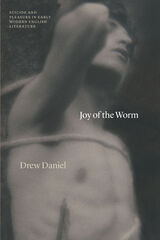
In this study, Drew Daniel identifies a surprisingly common aesthetic attitude that he calls “joy of the worm,” after Cleopatra’s embrace of the deadly asp in Shakespeare’s play—a pattern where voluntary death is imagined as an occasion for humor, mirth, ecstatic pleasure, even joy and celebration.
Daniel draws both a historical and a conceptual distinction between “self-killing” and “suicide.” Standard intellectual histories of suicide in the early modern period have understandably emphasized attitudes of abhorrence, scorn, and severity toward voluntary death. Daniel reads an archive of literary scenes and passages, dating from 1534 to 1713, that complicate this picture. In their own distinct responses to the surrounding attitude of censure, writers including Shakespeare, Donne, Milton, and Addison imagine death not as sin or sickness, but instead as a heroic gift, sexual release, elemental return, amorous fusion, or political self-rescue. “Joy of the worm” emerges here as an aesthetic mode that shades into schadenfreude, sadistic cruelty, and deliberate “trolling,” but can also underwrite powerful feelings of belonging, devotion, and love.

Each of the twelve essays considers a different poet—Edward Thomas, Henry W. Longfellow, George Scarbrough, Elizabeth Bishop, Geoffrey Hill, Primus St. John, Robert Hayden, Elizabeth Coatsworth, Gwendolyn Brooks, Robert Frost, E.A. Robinson, and Belle Randall—and, alongside them, different concerns of parenting and living. Organized in chronological order, they track the growth of Nathaniel Perry’s own children who pop up from time to time in a believable way. Essays consider the idea of devotion and belief, the idea of imperfection, the small details we can focus on as parents, and the conceptions of the world we pass along to our children. Together these essays not only represent the author's personal canon of poets who have been important to him in his life and work, but also present a diverse slice of American poetry, in voice, form, identity, origin, and time period.
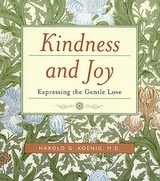
This book includes guidance as well as information and inspiration. There are practical recommendations on how to perform acts of kindness in personal lives and at work, toward friends, colleagues, and family members—even with one's enemies. Suggestions are also offered on ways to encourage others to be kind so they, too, can experience the joy that results.

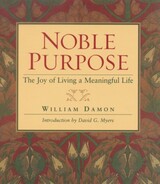
This book describes the personal and spiritual benefits of living life in a way that matters, with an awareness that one's life can reflect a sense of higher purpose no matter what the circumstances. The book draws upon religious, philosophical, and literary writings to show how humans in many cultures and historical epochs have pursued noble purposes by answering God's call as each hears it.
Noble purpose can be pursued both in heroic acts and in everyday behavior. The book shows how ordinary people—teachers, business professionals, parents, citizens—can ennoble what they do by being mindful of its deepest meaning. It also points out that humility is a necessary virtue for those who pursue a noble purpose. Great heroes are bold, courageous, and sometimes audacious in their determination to succeed; but they are also humble in their awareness of their own limitations. Moreover, a person must never violate basic moral laws while pursuing a noble purpose—the means must be as moral as the ends.
Purpose brings coherence and satisfaction to people's lives, producing joy in good times and resilience in hard times. It also presents a paradox: hard work in service of noble purpose that transcends personal gain is a surer path to happiness than the self-indulgent pursuit of happiness for its own sake. The closer we come to God's purpose for us, the more satisfied our lives become.
From the inspiration and examples conveyed in this book, we learn that all individuals have the capacity to discover their own God-given abilities, to learn the world's need for the services they can provide, and to experience joy in serving society and God in their special ways. As theologian Frederick Buechner writes, "The place God calls you to is the place where your deep gladness and the world's deep hunger meet."

There’s an undeniable audacity in a poet using the word “joy” in our beleaguered world. In her new book, Karen An-hwei Lee combines scientific precision and an appetite for far-flung vocabularies with a fascination for the sources of rapturous emotion.
In poems that roam from the intimacy of prayer to the art of brewing tea, from bamboo-related famine to quasars, the globe’s minor seas, and the nuptial flight of ants, Phyla of Joy reaches toward ecstasy.

“Fundamental changes are needed in American formal education,” writes the former Dean of the Harvard Graduate School of Education, “yet the resistance to these changes is neither mindless nor conspiratorial.” Generally speaking, Americans are content with schools as they are, convinced that they well serve society's (albeit ill-defined) symbolic and economic needs. Most people who do complain are protesting the schools' failure to deliver on their existing promises; they are not demanding that schools change their basic goals. Theodore Sizer suggests that the sloppy drift of purpose prevalent in American education today could be corrected by carefully articulating the ends of education, relating these to public aspirations and beliefs.
Sharpen the focus of the schools, he recommends, and separate the different kinds of learning in different places. A single school cannot simultaneously provide for the learning of intellectual power, personal agency (the ability to “make it”), and joy (the capacity for pleasure). What is required, he argues, are multiple schools, each focusing on limited ends. His book is not a noisy indictment but a dispassionate exploration that moves beyond outrage to a balanced appraisal of why American education is the way it is and how it might be different. His argument is both reasonable and provocative.
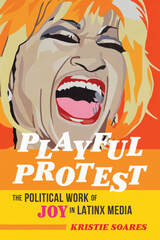
Joy is a politicized form of pleasure that goes beyond gratification to challenge norms of gender, sexuality, race, and class. Kristie Soares focuses on the diasporic media of Puerto Rico and Cuba to examine how music, public activist demonstrations, social media, sitcoms, and other areas of culture resist the dominant stories told about Latinx joy. As she shows, Latinx creators compose versions of joy central to social and political struggle and at odds with colonialist and imperialist narratives that equate joy with political docility and a lack of intelligence. Soares builds her analysis around chapters that delve into gozando in salsa music, precise joy among the New Young Lords Party, choteo in the comedy ¿Qué Pasa U.S.A.?, azúcar in the life and death of Celia Cruz, dale as Pitbull’s signature affect, and Alexandria Ocasio-Cortez’s use of silliness to take seriously political violence.
Daring and original, Playful Protest examines how Latinx creators resist the idea that joy only exists outside politics and activist struggle.
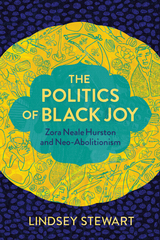
Stewart develops Hurston’s contributions to political theory and philosophy of race by introducing the politics of joy as a refusal of neo-abolitionism, a political tradition that reduces southern Black life to tragedy or social death. To develop the politics of joy, Stewart draws upon Zora Neale Hurston’s essays, Beyoncé’s Lemonade, and figures across several disciplines including Frederick Douglass, W. E. B. Du Bois, Toni Morrison, Angela Davis, Saidiya Hartman, Imani Perry, Eddie Glaude, and Audra Simpson. The politics of joy offers insights that are crucial for forming needed new paths in our current moment. For those interested in examining popular conceptions of Black political agency at the intersection of geography, gender, class, and Black spirituality, The Politics of Black Joy is essential reading.
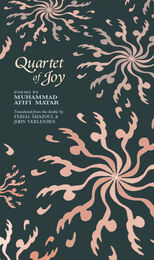

Some Glad Morning, Barbara Crooker’s ninth book of poetry, teeters between joy and despair, faith and doubt, the disconnect between lived experience and the written word. Primarily a lyric poet, Crooker is in love with the beauty and mystery of the natural world, even as she recognizes its fragility. But she is also a poet unafraid to write about the consequences of our politics, the great divide. She writes as well about art, with ekphrastic poems on paintings by Hopper, O’Keeffe, Renoir, Matisse, Cézanne, and others. Many of the poems are elegaic in tone, an older writer tallying up her losses. Her work embodies Bruce Springsteen’s dictum, “it ain’t no sin to be glad we’re alive,” as she celebrates the explosion of spring peonies, chocolate mousse, a good martini, hummingbirds’ flashy metallics, the pewter light of September, Darryl Dawkins (late NBA star), saltine crackers. While she recognizes it might all be about to slip away, “Remember that nothing is ever lost,” she writes, and somehow, we do.

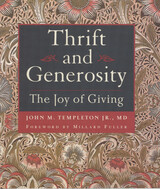
In these difficult economic times, thrift may seem like a necessity, rather than a route to joy. But in this handbook, the reader learns about the virtue of thrift, and how, in combination with gratitude and generosity, it can lead to deep, lasting contentment.
READERS
Browse our collection.
PUBLISHERS
See BiblioVault's publisher services.
STUDENT SERVICES
Files for college accessibility offices.
UChicago Accessibility Resources
home | accessibility | search | about | contact us
BiblioVault ® 2001 - 2024
The University of Chicago Press









